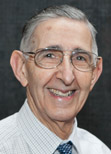July 14, 2009
Frank Liebermann discusses life in Germany after the Nazis came to power in 1933. Shortly after taking power, the Nazis began to eliminate individual rights and freedoms for Jews in Germany. This changed daily life for Frank and his family in many ways. Frank's father was a physician and it became increasingly difficult for him to practice medicine after 1933.
LISTEN
TRANSCRIPT
FRANK LIEBERMANN:
We couldn’t use parks. Stores were boycotted. As I said hospital privileges were delayed rather were rescinded.
NARRATOR:
Over 60 years after the Holocaust, hatred, antisemitism, and genocide still threaten our world. The life stories of Holocaust survivors transcend the decades and remind us of the constant need to be vigilant citizens and to stop injustice, prejudice, and hatred wherever and whenever they occur.
This podcast series presents excerpts of interviews with Holocaust survivors from the United States Holocaust Memorial Museum’s public program First Person: Conversations with Holocaust Survivors.
In today’s episode Frank Liebermann talks with host Bill Benson about the changes he experienced in Germany after the Nazis came to power in 1933. Shortly after taking power, the Nazis began to eliminate individual rights and freedoms for Jews in Germany.
BILL BENSON:
Frank, tell us a little bit about your early schooling. We noted in the opening commentary on the slides that there was a great deal of antisemitism at that time and you were experiencing it in the schools.
FRANK LIEBERMANN:
We had three rooms for the first, second, and third grades. It was segregated within the school and the most scary part of the day was for recess. Everybody had to leave the building around lunchtime for about half an hour. We generally tried to navigate between… the boys and girls were separated on one side and the other side of the yard. Basically, we tried to navigate in between where we had supervision and basically were not physically harmed but it was the most unpleasant part of the school day.
BILL BENSON:
When you said you had three rooms for your grades, that was three rooms for the Jewish students in a larger public school?
FRANK LIEBERMANN:
That’s correct, in a large school. All facilities were already being closed elsewhere.
BILL BENSON:
Closed to Jews?
FRANK LIEBERMANN:
Yes. We couldn’t use parks. Stores were boycotted. As I said hospital privileges were delayed--rather, were rescinded. My father’s brother lost his job and went from a government economist and found a job in Austria as an assistant manager of a department store. But everybody wanted to make a living and wanted to do the best he could.
BILL BENSON:
For your father, losing hospital privileges and other changes essentially meant he could not practice medicine?
FRANK LIEBERMANN:
That’s correct. Germany had socialized medicine, which means that the government basically paid for all the patients. Therefore, they stopped doing that so that he was still treating some people who wanted…whom he knew but even at that point, after 1936, an SA Nazi guard stood in front of the office and asked anybody who was coming upstairs what he was doing and threatened them with loss of jobs and other punishments so that for all practical purposes he knew in 1936 that he couldn’t make a living.
BILL BENSON:
And Frank you told me that at that time everywhere you looked there was fierce antisemitic propaganda being posted.
FRANK LIEBERMANN:
I forgot, I am sorry, also the main street corners had postings of Der Stürmer which means “a storm.” It’s hard to translate again. It’s basically, it means, call it “the coming storm” or whatever it’s called, which was entirely an antisemitic paper which showed caricatures, ugly caricatures, stories of harm being done to children, harm being done all by Jews against Germany. [It] just portrayed everybody as being extremely ugly and being people to stay away from. They were published on a weekly basis and were put kind of on stands. I don’t know if you have ever seen it. It’s behind glass so that if anybody was at a bus stop they could immediate…they had some good reading material in order to educate them.
BILL BENSON:
Like we see advertisements at bus stations today, only it was horrible propaganda.
FRANK LIEBERMANN:
Exactly, exactly. Yes.
NARRATOR:
You have been listening to First Person: Conversations with Holocaust Survivors, a podcast series of the United States Holocaust Memorial Museum. Every Wednesday at 1 p.m. from March through August, Holocaust survivors share their stories during First Person programs held at the Museum in Washington, DC. We would appreciate your feedback on this series. [Please take our First Person podcast survey (external link) and let us know what you think.]
[On] our website you can also learn more about the Museum’s survivors, listen to the complete recordings of their conversations, and listen to the Museum podcasts Voices on Antisemitism and Voices on Genocide Prevention.


